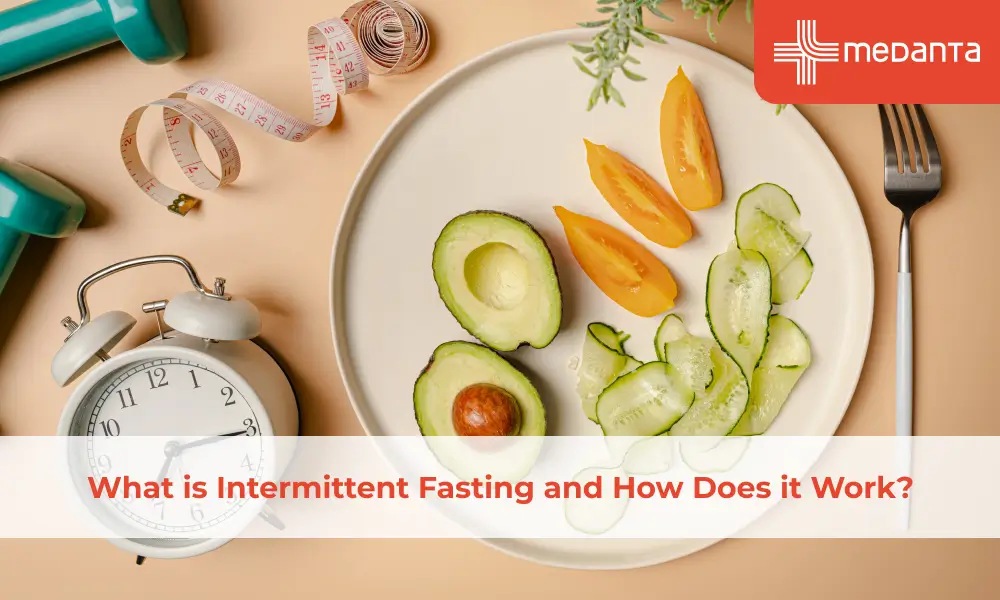What is Intermittent Fasting and How Does it Work?

TABLE OF CONTENTS
- What is Intermittent Fasting?
- How Does Intermittent Fasting Work in the Body?
- Benefits of Intermittent Fasting for Health
- Different Types of Intermittent Fasting Schedules
- How to Do Intermittent Fasting the Right Way
- Foods to Eat & Avoid During Intermittent Fasting
- Intermittent Fasting for Weight Loss
- Common Mistakes to Avoid in Intermittent Fasting
- Who Should Avoid Intermittent Fasting?
- Conclusion
- FAQs
Intermittent fasting has become one of the most popular health and fitness trends worldwide. People have used fasting to heal their bodies since ancient times. Life in India made maintaining a healthy weight easier 50 years ago, but eating habits have changed significantly. Recent scientific studies suggest that intermittent fasting could help turn these concerning health trends around.
This practice does more than just help people manage their weight. Studies show that fasting periods benefit the body beyond fat burning. Research indicates positive effects on brain and heart health. Research has also shown that it can prevent and reverse certain diseases.
You don't need to follow a rigid plan with intermittent fasting. Each person can adapt it to fit their lifestyle since there's no "perfect" fasting schedule.
What is Intermittent Fasting?
If you talk about traditional diet plans they are based on what to eat. On the other hand intermittent fasting tells you how & when you have your food. The plan follows eating & fasting cycles (on a regular schedule). This approach doesn't restrict specific foods but creates specific timeframes for meals.
You can drink calorie-free beverages like water, black coffee, and herbal tea at the time of fasting. Some versions let you eat small amounts of low-calorie foods during these periods.
This eating pattern doesn't mean starving yourself. Our body evolved to function without food for long periods. Our ancestors hunted and gathered food thriving despite irregular eating patterns. Many religious traditions like Islam, Christianity, Judaism, and Buddhism have embraced fasting practices.
People can adapt intermittent fasting to fit their daily routines, though finding the right approach might need some trial and error.
How Does Intermittent Fasting Work in the Body?
Your body changes its fuel sources dramatically when you stop eating. The brain relies on glucose as its main energy source at first. After going without food for several hours, a fascinating process called 'metabolic switching' begins.
The body runs out of liver glycogen and starts burning fat around the 12-hour fasting mark. This makes the liver convert fatty acids into ketone bodies that become a major energy source for many tissues, especially the brain. By the 24-hour mark, blood ketone levels usually reach 2-5 mM.
This transformation in metabolism brings several hormonal changes (including but not limited to):
Insulin drops by a lot, which lets fat cells release stored fatty acids
Glucagon rises and helps break down liver glycogen
Human growth hormone can increase up to five times, which helps preserve muscle while burning fat
Time-restricted eating decreases hunger hormones like ghrelin, which helps people feel less hungry throughout the day.
Norepinephrine levels go up, which boosts alertness and fat burning
At the cellular level, important repair mechanisms are activated during fasting. The body steps up autophagy (cellular cleaning), makes mitochondrial function better, and boosts DNA repair systems. The body's longevity proteins, called sirtuins, also become active and reduce oxidative stress throughout.
These biological changes help explain why intermittent fasting can improve insulin sensitivity, lower inflammation, and possibly help you live longer.
Benefits of Intermittent Fasting for Health
The health benefits of intermittent fasting are way beyond the reach and influence of fat burning alone.
Studies consistently demonstrate below mentioned health improvements (including but not limited to):
Enhanced brain function - Research shows intermittent fasting improves working memory in animals and verbal memory in adult humans
Stronger heart health - Fasting improves blood pressure and resting heart rate
Better physical performance - Young men who fasted for 16 hours managed to keep muscle mass while losing fat
Diabetes management - Fasting can reduce insulin resistance, lower fasting glucose, and in some cases, reverse the need for insulin therapy in type 2 diabetes patients
Reduced inflammation - This eating pattern decreases oxidative damage and inflammation throughout the body
Intermittent fasting triggers autophagy, which is a vital cellular cleaning process that removes waste materials from cells. This protective mechanism helps prevent several diseases, including heart disease, inflammatory bowel disease, certain cancers and neurodegenerative conditions.
Most people experience these benefits within several weeks after starting a consistent fasting routine.
Different Types of Intermittent Fasting Schedules
Several common approaches include:
The 16/8 Method - An 8-hour eating window followed by 16 hours of fasting.
Eat-Stop-Eat - A full 24-hour fast once or twice weekly.
The 5:2 Diet - Normal eating for five days, with calorie intake restricted to 500-600 calories on two non-consecutive days.
Alternate-day fasting alternates between regular eating days and fasting days.
The Warrior Diet - You can eat small amounts of raw fruits & vegetables during a 20-hour fast, followed by one large evening meal.
How to Do Intermittent Fasting the Right Way

Your fasting journey should begin with shorter periods before you try longer ones. Water, herbal tea and unsweetened tea help you stay hydrated during fasting windows. Pick a schedule that matches your daily routine. Small (protein-rich) meals work better than large portions when breaking your fast.
Foods to Eat & Avoid During Intermittent Fasting
Your eating windows should focus on:
Protein - Eggs, fish, lean meat, chicken, tofu, lentils, chickpeas, Greek yoghurt, and cottage cheese.
Healthy fats - Avocado, olive oil, nuts (almonds, walnuts, cashews), seeds (chia, flax, sunflower), and fatty fish like salmon or sardines.
Complex carbs - Whole grains like brown rice, quinoa, oats, barley, millet
Fibre-rich vegetables and fruits
Ultra-processed foods, sugary drinks, and excessive snacking should be limited. The Mediterranean diet serves as an excellent blueprint for meal planning.
Intermittent Fasting for Weight Loss
Weight management improves through reduced total calorie consumption during fasting. Studies show weight loss between 0.8% and 13% of body weight over 2-12 weeks. The 16/8 method combined with calorie restriction works especially when you have weight control goals as an overweight adult.
Common Mistakes to Avoid in Intermittent Fasting
Excessive eating during feeding windows cancels out fasting benefits.
Poor hydration causes headaches and fatigue.
Low calorie intake can slow your progress.
Saving all daily calories until evening might trigger binge eating.
Any caloric intake breaks a fast—even butter in coffee.
Who Should Avoid Intermittent Fasting?
Intermittent fasting brings many health benefits, but it's not right for everyone.
Doctors recommend that these people (including but not limited to) stay away from intermittent fasting:
People with diabetes especially those on insulin or blood sugar medications
If you are a heart disease patient (especially with unstable chest pain or recent heart problems)
Pregnant or nursing mothers who need steady nutrition for themselves and their baby
Children, teens, and young adults who still have growing bodies
For elderlies above 65 who might feel weak, get dizzy and fall or lose muscle mass
People who have dealt with eating disorders since fasting could bring back unhealthy eating habits
Those who weigh too little and might become malnourished
People taking multiple medications at different times for conditions like high blood pressure
Anyone with a weak immune system who needs regular nutrients
If you are someone with weak bones (since eating less might reduce important minerals like vitamin D)
Conclusion
Intermittent fasting is more than just another diet trend. This eating pattern works with your body's natural processes and taps into ancient survival mechanisms while delivering modern health benefits. People usually find a schedule that fits their lifestyle after trying different approaches like the 16/8 method or the 5:2 diet.
The way intermittent fasting ended up working depends on finding a rhythm of consistency. People say they feel more energetic, focused, and healthier after they get used to this eating pattern. It's practical enough for busy lives and still brings real health improvements. Someone looking to lose weight, boost their well-being, or simplify their relationship with food will find that intermittent fasting gives them a simple framework that aligns with how our bodies naturally work.
FAQs
What does intermittent fasting mean?
Intermittent fasting is a cycle between periods of eating and fasting (with timing your meals being the foundation of this diet rather than choosing specific foods). This approach requires you to abstain from calories for extended periods typically between 12 and 40 hours.
How do I start intermittent fasting?
The easiest way to start is with a shorter fasting period, like the 12-hour fast from 8 PM to 8 AM. Most beginners find this manageable since it includes sleep time. Your body will adapt as you gradually extend the fasting window. Black coffee, water, or unsweetened tea can keep you hydrated during fasting periods.
What is the best intermittent fasting schedule?
Each person's ideal schedule differs. Popular options include:
16/8 method: Eating within an 8-hour window (e.g., 10 AM to 6 PM)
5:2 approach: Normal eating five days, 500-600 calories on two non-consecutive days
24-hour fasting: Complete fast once or twice weekly
What foods can you eat during intermittent fasting?
Zero-calorie beverages are your only option during fasting periods. Your eating windows should focus on whole foods including:
Fruits and vegetables
Whole grains
Lean proteins
Healthy fats
Does intermittent fasting really help with weight loss?
Research shows that intermittent fasting reduces weight by 0.8% to 13% of baseline body weight. The process works by making it easier to consume fewer calories overall.
Is intermittent fasting safe for everyone?
Intermittent fasting isn't suitable for pregnant women, children, people with diabetes, individuals with eating disorders, or older adults. A doctor should be consulted before starting any fasting routine.
How long should you do intermittent fasting for the best results?
You'll likely notice changes within 1-4 weeks - weight loss, better energy levels, and improved blood sugar control. The benefits expand between 4-12 weeks with better insulin sensitivity, lower blood pressure, and more fat burning.
Can intermittent fasting improve metabolism?
The answer is yes! Short term fasting can give your metabolism a quick boost. Fat-burning hormones like norepinephrine and human growth hormone get a natural boost. This eating pattern helps maintain muscle mass better than conventional diets. Your body becomes more efficient (as it switches from glucose to ketones for energy).
Are there side effects of intermittent fasting?
These temporary effects may occur:
Headaches
Fatigue and lethargy
Hunger pangs
Irritability or mood changes
Dizziness
Your body adapts within a few days and most symptoms fade away.
Can intermittent fasting help with blood sugar control?
The results are clear! Your insulin sensitivity improves while insulin resistance decreases. Blood glucose control gets better even with brief fasting periods. Many diabetic patients need less medication after starting this practice.






